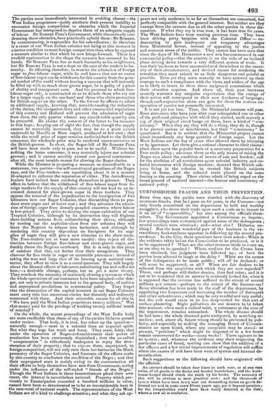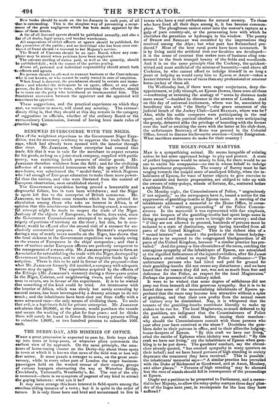CUSTOMHOUSE FRAUDS AND THEIR PREVENTION.
SOME time ago, the public were startled with the discovery of enormous frauds, that hai gone on for years, in the Customs—not only frauds committed on the department by bold and wealthy smugglers, who drove their trade upon such a scale as to impart to it an air of "respectability," but also among the officials them- selves. The Government appointed a Commission to inquire; law-proceedings were commenced against some of the delinquents ; several verdicts were obtained ; and—what else ? Hitherto, no- thing! Not the least wonderful part of the business is the ex- traordinary backwardness apparent in following up the several pro- ceedings. In the City' these questions have been asked—When is the evidence taken before the Commission to be produced, or is it to be suppressed ? When are the other revenue-trials to come on, or are they to be quashed ? Where verdicts for the Crown haie been obtained, has judgment been followed up ; or have the parties been allowed to laugh at the delay ? When are the names of the delinquents to be made public; will all be declared; or will some be suppressed, or all ? When are fair dealers to be relieved from the suspicions with which they are now regarded? These, and perhaps still darker doubts, thus find voice; and it is not to be wondered that an answer is anxiously looked for, when it is supposed that the revenue has suffered to the extent of several millions per annum—perhaps to the extent of the Income-tax! Some alteration has been made in the staff of the department, by appointing two Inspectors and increasing the number of Surveyors and other subordinates ; which may be very needful and very useful; but the evil would seem to be too deep-seated for that sort of surface-plastering. Slight palliatives .do not deserve to be taken into account, when such a radical taint, a rottenness at the core of the department, remains untouched. The whole disease should be laid bare; the whole diseased parts extirpated, by searching re- medies; and, above all, future wrong should be prevented by pub- licity, and especially by making the managing Board of Commis- sioners an open board, where any complaint may be stated: at present, "petitions" which might be disposed of in a few hours remain unanswered for weeks—many weeks! There appears to be no system ; and, whatever the evidence may show respecting the particular cases of fraud, nothing can show that the addition of a few officers and a few trivial improvements of regulation will suffice where the causes of evil have been want of system and internal de- moralization.
Such suggestions as the following should have originated with the officials.
Au account should be taken four times in each year, or at any rate twice, of all goods in the docks and bonded warehouses ; and the ware- house-keeper should check the stock by his books. The necessity of this will be obvious to most practical men ; and the thousands of letters which have been lately sent out demanding duties on goods de- livered ten and in some cases fifteen years ago, put it beyond question ; for the irregularities could have been easily detected at the time, whereas now all is confusion. New books should be made on theist January in each year, of all lbst is outstanding. This is the simplest way of preventing a recur- -Twice of the gross negligence which has been made apparent by the s'iraua of these letters.
,A list of all licensed agents should be published annually, and also a list of all docks, legal quays, and bonded warehouses.
All suspensions of either officers or agents should be published, for the protection of the public ; and no individual who has been once con- Tien d of fraud should be restored to her Majesty's service.
'The Board of Customs should be an open Board, where any com- plaint may be stated when petitions have been neglected.
The amount sterling of duties paid, as well as the quantity, should be published daily, with the names of the parties paying.
Above all, personal and individual responsibility should attach both sata officers and agents.
No person should be allowed to transact business at the Customhouse who is not known, or who cannot be easily traced in case of suspicion.
When fraud is detected, the punishment should be certain and imme- diate; and whether the delinquent be an agent, officer, or any other person, the first thing to be done, after punishing the offender, should be to trace out the party who introduced or recommended him. The -fraudulent connexion between the appointer and the appointed will sometimes be apparent.
These suggestions, and the practical experience on which they rest, we venture to assert, will stand any scrutiny. The extraor- dinary thing is, that they should at this day remain in the category of suggestions to officials, whether of the ordinary Board or the extraordinary Commission, instead of having been made rules of *retake long ago.



























 Previous page
Previous page